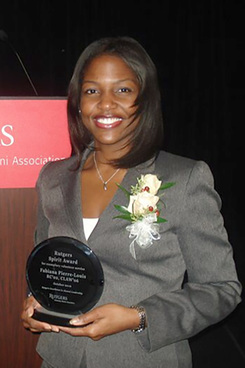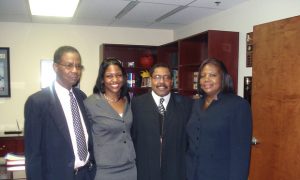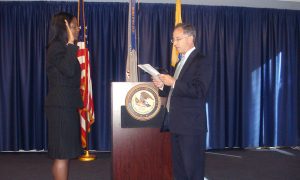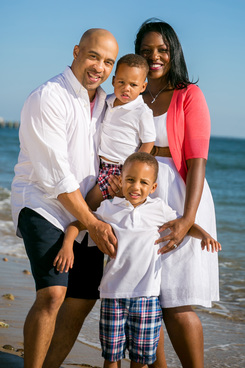How Fabiana Pierre-Louis 'Just Ultimately Stood Out' Among Governor's Inner Circle, and Beyond
"When you have that set of references, it's pretty powerful," Gov. Phil Murphy's chief counsel Matt Platkin said of Pierre-Louis. "She never campaigned for this job. The first outreach was from us to her—that was in early 2020."
June 10, 2020 at 09:00 AM
15 minute read
 Fabiana Pierre-Louis at a Rutgers University Alumni Awards event where she won a Rutgers Spirit Award.
Fabiana Pierre-Louis at a Rutgers University Alumni Awards event where she won a Rutgers Spirit Award.
Fabiana Pierre-Louis, Gov. Phil Murphy's pick to fill the state Supreme Court seat being vacated by Justice Walter Timpone later this year, easily wins people over, works very hard, is deliberate in her thoughts, and has flawlessly balanced being a high-powered attorney and a mother of two young sons, according to colleagues, former supervisors, lawmakers and members of the governor's office who made her nomination official recently.
"Her credentials speak for themselves," Matt Platkin, chief counsel to Murphy and considered the architect of Pierre-Louis' nomination, said in a phone interview on Monday. "She clerked for Justice [John] Wallace, she handled difficult cases at the U.S. Attorney's Office, she's a partner at Montgomery McCracken. She is clearly a talented attorney."
"Everyone spoke of her abilities," added Platkin. "But another thing that came through was how kind she is, and that her humanity is in every aspect of her work, and that she clearly carries with her the perspective of her own past, which could influence her as a justice, and … it will benefit ultimately the court and the people of this state."
"New Jersey is lucky to have a number of qualified candidates who were given very serious consideration, which they should for this process," Platkin said. "Fabiana just ultimately stood out."
Pierre-Louis is currently a partner at Montgomery, McCracken, Walker & Rhoads in Cherry Hill, in the firm's white-collar and government investigations practice group.
Her nomination is being vetted by the New Jersey State Bar Association, and from there, she must go before the 40-member Senate for confirmation.
Another senior administration official, who spoke on the condition of anonymity because of the sensitivity of the nomination process, said the Murphy administration is hoping Pierre-Louis' confirmation is finalized this summer, giving Pierre-Louis time to finish her business at Montgomery McCracken and be in place for the new Supreme Court calendar year that begins on Sept. 1. Her ultimate Senate confirmation date lies with Senate President Steven Sweeney, D-Gloucester, and Senate Judiciary Chairman Nicholas Scutari, D-Union, whose 11-member committee will vote on the nomination before going to the full Senate for a floor vote.
Timpone turns 70 on Nov. 10, reaching the mandatory retirement age for judges in the state. The same official said it was unlikely Timpone would stay until then. The more likely scenario, said the official, would be for Timpone to leave the court before Sept. 1, allowing Pierre-Louis – once confirmed - to start the new court year with her colleagues: Chief Justice Stuart Rabner and Associate Justices Jaynee LaVecchia, Barry Albin, Anne Patterson, Faustino Fernandez-Vina and Lee Solomon.
The Judiciary declined to comment on Timpone's departure.
Catching the Administration's Eye
The path to becoming a Supreme Court justice nominee began months ago for Pierre-Louis. It's one fraught with politics, where connections to powerful insiders never hurts.
The unnamed senior government official said the Governor's Office began preparing in late 2019 for a potential spring nomination announcement. But the pandemic thwarted that timeline somewhat.
"Ideally, we were hoping to get confirmation in June or July of this term," said the official. "Obviously, the coronavirus threw a wrench in that schedule and made doing our due diligence difficult."
"We put feelers out to regular players and people the governor knew from Washington [D.C.] and different walks of life, and took recommendations from various organizations, and we ran our own process—conducting multiple interviews from our office," said the official, adding that the potential nominees interviewed with Platkin and "had several interviews with the governor."
According to Platkin, he first met with Pierre-Louis in early February, for breakfast at a diner near Trenton, after her name came up from various sources as a potential pick.
"She was referred to us by many different sources, from private practice, some from a personal capacity, and when she was in law enforcement," Platkin said. "When you have that set of references, it's pretty powerful. She never campaigned for this job. The first outreach was from us to her—that was in early 2020."
Platkin spoke a number of times with Pierre-Louis over the course of the next four months.
"She interviewed with me and several others"—in the Murphy administration – "throughout the process," said Platkin. "We reviewed her papers, conducted a background check, she did a formal interview process with the judiciary panel. It's an extensive process so that, should the governor go forward with her nomination, we wanted to make sure she was the right pick."
Pierre-Louis checked all the boxes.
"She was approved unanimously by the Governor's panel … and we did a state police background check, which she passed," said Platkin.
There was an added element to the process since Pierre-Louis had never been a judge.
"She was not a judge, so we had to go with other people about cases she brought on as a prosecutor, and we talked to people she worked with," added Platkin. "The challenge was that most of those interviews were done via Zoom," because of the pandemic.
The governor's Judicial Advisory Panel, composed of former Supreme Court Chief Justices James Zazzali and Deborah Poritz; retired Justices Wallace, Virginia Long and Stewart Pollock; retired Superior Court Judge Peter Doyne; and former president of the New Jersey State Bar Association John Keefe, gave Pierre-Louis a unanimous endorsement. "The panel found that the candidate has the competence, integrity and judicial temperament to be an outstanding Justice."
Platkin said on June 3, "Everything came back, and the governor decided he wanted to move forward with her nomination. He spoke to her, and she was obviously overjoyed."
"Fabiana is an incredible nominee," Platkin said, "and she will be a phenomenal Justice once she's confirmed by the Senate, and has the potential to shape the court for a generation to come. She is a barrier-breaking nominee, and we couldn't be prouder of the governor's pick and of her wanting to serve."
Her connection to Wallace, the most recent African American to serve on the Supreme Court, was a factor, but not an overriding one. Pierre-Louis had clerked for Wallace while a student at Rutgers Law School at Camden. She listed the former justice as her mentor in her bio.
 Fabiana Pierre-Louis (second from left) and her parents pictured with Justice John Wallace when she clerked for him.
Fabiana Pierre-Louis (second from left) and her parents pictured with Justice John Wallace when she clerked for him.Wallace was appointed to the court in 2003 by then-Gov. James McGreevey, a Democrat, but denied renomination by Gov. Chris Christie, a Republican, in 2010 over what some say were decisions unpopular with Christie.
"We can't ignore what happened to Justice Wallace," said Platkin. "Certainly, it has some bearing that she clerked for him. There is that symmetry. He left the bench under contentious terms so it's icing on the cake should she retake the seat."
But the Governor's Office said the Wallace connection was just one factor among many in a very lengthy vetting process, and that Wallace had recused himself from reviewing Pierre-Louis's nomination before the judicial panel to avoid any conflicts.
"Her qualifications and respect from her colleagues on the other side of the bar were just remarkable," Platkin said. "I have not seen another candidate where everyone used the same kind of language to recommend her—that she is incredibly smart, kind, fair, with a just sense of humanity and a deep sense of empathy. Everyone put that down."
'True Passion for the Law'
Everyone, including Georgette Castner, who nominated Pierre-Louis for a Diverse Attorney of the Year Award from the New Jersey Law Journal in 2019. Pierre-Louis was among the honorees.
Castner has known Pierre-Louis for 15 years. They first met at the Eagleton Institute of Politics at Rutgers Camden when they were both in the one-year Governor's Executive Fellowship program for women entering New Jersey branches of government.
Castner said she had a lot in common with her fellow classmate: Both grew up in New Jersey and spent their entire careers in the state.
"It was a good fit," recalled Castner, a partner at Montgomery McCracken and member of the firm's commercial litigation practice and co-chairwoman of the cannabis practice. "We immediately made a connection there and started as first-year associates at [the firm] in 2007."
"It was full circle for her to come back last year," said Castner, who is married to William Castner, former firearms policy expert in Murphy's cabinet who in January returned to private practice, joining Connell Foley's Cherry Hill office.
"Fabiana brings a tremendous amount of energy to the office with her work ethic and she is just a joy to be around," Castner added.
"She's not only smart, but extremely hardworking and a genuinely good person," Castner said. "She has a true passion for the law and also loves her family. She is an amazing mom and has had the ability to balance the role of lawyer and mom—and to do both flawlessly is admirable."
Beginnings
At a separate event from her nomination announcement on June 5, Pierre-Louis thanked Murphy for picking her. For one minute and 16 seconds, she spoke of her humble roots as the daughter of Haitian immigrants who taught her to work hard and dream big.
Pierre-Louis said her father was a New York City cabdriver, and her mother an patient transport aide at St. Vincent's Hospital. Both came to America "with little more than the shirts on their backs," she said.
"My life is not the traditional trajectory of someone who would someday be nominated to the Supreme Court," said Pierre-Louis in a soft-spoken manner behind the podium. "I am the first person in my family to go to law school."
Other facts about the nominee: Pierre-Louis is a first-generation-born American citizen. Her family of seven while growing up lived in a cramped, two-bedroom Brooklyn apartment before her parents saved enough money to move to their own home in Irvington.
"[As] I stand here today, I know I have lived and continue to live the American Dream that my parents came here in search of," said Pierre-Louis.
At 39, she has broken barriers already.
Pierre-Louis served as a prosecutor in the U.S. Attorney's Office for the District of New Jersey's
 Fabiana Pierre-Louis at her swearing in for the U.S. Attorney's Office for the District of New Jersey in 2010, with Paul Fishman.
Fabiana Pierre-Louis at her swearing in for the U.S. Attorney's Office for the District of New Jersey in 2010, with Paul Fishman.Criminal Division from 2010 to 2019. Pierre-Louis began working in the Newark office in the General Crimes Unit, then later in the Organized Crime and Gangs Unit, where she handled diverse caseloads that included bank robberies, firearms offenses, child exploitation matters, investigations of street gangs, and federal narcotics offenses, as well as managed her own individual caseload, according to her resume.
She was later the attorney-in-charge of the office's Camden and Trenton branches—the first woman of color to hold both positions—where she supervised all aspects of criminal matters handled by those offices, including investigations and prosecutions of large-scale drug-trafficking organizations, complex mail and wire fraud offenses, health-care and government fraud matters, and violent crimes.
"Obviously, I think very highly of her. I promoted her," U.S. Attorney for the District of New Jersey Craig Carpenito said by phone Tuesday during his drive back from Washington, D.C., to Central Jersey after testifying before the Senate Judiciary Committee.
"She was beloved," said Carpenito, who succeeded Paul Fishman in 2018 to become U.S. Attorney, of her tenure. "The best story I have of her is when she was supervising the Trenton office. I held 20-minute meetings with each of the assistant U.S. attorneys there, and I asked them to tell me about the office and what they would do differently or the same.
"All of them said to me, 'You have to keep Fabiana as the Trenton supervisor. She is fantastic.' What made her a great supervisor is she could combine all of her legal skills with managing other attorneys with a deft touch and a compassionate ear," Carpenito said.
Last year, Pierre-Louis returned to Montgomery McCracken.
A 'Trailblazer'
Pierre-Louis is a trustee of the Association of the Federal Bar of New Jersey and previously served on the board of directors of the Haitian American Lawyers Association of New Jersey. While at Rutgers Law-Camden, she was vice president of the Black Law Students Association.
Several bar associations, including the New Jersey Women Lawyers Association, are supporting her nomination to become a Supreme Court justice, describing her as a "dedicated, experienced and exceptionally qualified woman to our State's highest court."
"She is a superstar," said Theodore Wells Jr., a partner at Paul, Weiss, Rifkind, Wharton & Garrison in New York, considered among the most prominent African American defense attorneys in the country. Wells was tapped by Murphy, a Democrat, in spring 2019 to represent him in a tax incentives lawsuit. "Fabiana has a powerful intellect, great integrity and a passion for equal justice," he said.
'Representation Matters'
While Pierre-Louis never campaigned for the Supreme Court nomination, Sen. Troy Singleton, D-Burlington, her home senator, certainly supported the governor's announcement that she would be the next Supreme Court nominee.
Singleton is a member of the Senate Judiciary Committee, which is expected to soon hold a hearing over Pierre-Louis' nomination.
"She is a very thoughtful thinker," said Singleton, who represents the Seventh District. "In this social media world where people are quick to get their words out there as soon as possible—[that's] not her. There is a deliberateness and thoughtfulness in her words. She realizes words can have an impact, and she really spends a lot of time putting deep thoughts on any subject we have come across."
"She has a very collegial nature, an effervescence to her," added Singleton during a phone call on Monday. "She seeks to build consensus and is collaborative."
 Fabiana Pierre-Louis and her husband, Robert Reeves, and sons Robbie and Marc.
Fabiana Pierre-Louis and her husband, Robert Reeves, and sons Robbie and Marc.About seven years ago, Singleton met Pierre-Louis through her husband, Robert Reeves, when the two were part of a male supper club of African American professionals who got together monthly to discuss experiences and interactions. Singleton met up again with Pierre-Louis soon afterward at a mutual friend's home for a child's birthday party in Mount Laurel, where Pierre-Louis lives with her family. Singleton lives in nearby Delran.
"I really gravitated toward her," said Singleton. "She is a very warm and inviting person. It's hard not to gravitate toward her. Family matters to her, and [that's] why she is so grounded. She realizes how applying the law can have an impact on not just those in front of her, but also to those close to her family and close to her.
"Having that level of empathy, as well as her legal acumen, allows a unique perspective that will enhance our Supreme Court here in New Jersey," said Singleton. "We are at a tipping point unlike any other time in our nation's history. So many folks are no longer willing to walk away about a discussion on controversial matters, such as race and systematic barriers.
"In the justice system, to have someone on the bench who can look critically at some of those injustices and use their platform, and give some interpretation from the perspective of race and color that she has, will be a benefit. For so many of us, representation matters," Singleton said. "She is uniquely qualified to shoulder that weight and ensure that those words of 'equal justice' are not mere words but actually put into action."
Longtime Sen. Shirley Turner, D-Mercer, said Pierre-Louis' nomination "is really groundbreaking and she's a real trailblazer."
"I have been waiting for this for so long. We have had two African American males on the Supreme Court. Now, we have the first black woman—it's a void we've had for a long time," said Turner, who is black—and who on Monday, in response to the death of George Floyd at the hands of police, introduced legislation to classify the use of choke holds by law enforcement officers as deadly force.
"She's young, gifted and black and will be there for a long time—at least 30 years—[and] she could be there long enough to be chief justice," said Turner. "She has a long time to learn and move upward."
This content has been archived. It is available through our partners, LexisNexis® and Bloomberg Law.
To view this content, please continue to their sites.
Not a Lexis Subscriber?
Subscribe Now
Not a Bloomberg Law Subscriber?
Subscribe Now
NOT FOR REPRINT
© 2025 ALM Global, LLC, All Rights Reserved. Request academic re-use from www.copyright.com. All other uses, submit a request to [email protected]. For more information visit Asset & Logo Licensing.
You Might Like
View All


Law Firms Mentioned
Trending Stories
- 1Recent Controversial Decision and Insurance Law May Mitigate Exposure for Companies Subject to False Claims Act Lawsuits
- 2Visa Revocation and Removal: Can the New Administration Remove Foreign Nationals for Past Advocacy?
- 3Your Communications Are Not Secure! What Legal Professionals Need to Know
- 4Legal Leaders Need To Create A High-Trust Culture
- 5There's a New Chief Judge in Town: Meet the Top Miami Jurist
Who Got The Work
J. Brugh Lower of Gibbons has entered an appearance for industrial equipment supplier Devco Corporation in a pending trademark infringement lawsuit. The suit, accusing the defendant of selling knock-off Graco products, was filed Dec. 18 in New Jersey District Court by Rivkin Radler on behalf of Graco Inc. and Graco Minnesota. The case, assigned to U.S. District Judge Zahid N. Quraishi, is 3:24-cv-11294, Graco Inc. et al v. Devco Corporation.
Who Got The Work
Rebecca Maller-Stein and Kent A. Yalowitz of Arnold & Porter Kaye Scholer have entered their appearances for Hanaco Venture Capital and its executives, Lior Prosor and David Frankel, in a pending securities lawsuit. The action, filed on Dec. 24 in New York Southern District Court by Zell, Aron & Co. on behalf of Goldeneye Advisors, accuses the defendants of negligently and fraudulently managing the plaintiff's $1 million investment. The case, assigned to U.S. District Judge Vernon S. Broderick, is 1:24-cv-09918, Goldeneye Advisors, LLC v. Hanaco Venture Capital, Ltd. et al.
Who Got The Work
Attorneys from A&O Shearman has stepped in as defense counsel for Toronto-Dominion Bank and other defendants in a pending securities class action. The suit, filed Dec. 11 in New York Southern District Court by Bleichmar Fonti & Auld, accuses the defendants of concealing the bank's 'pervasive' deficiencies in regards to its compliance with the Bank Secrecy Act and the quality of its anti-money laundering controls. The case, assigned to U.S. District Judge Arun Subramanian, is 1:24-cv-09445, Gonzalez v. The Toronto-Dominion Bank et al.
Who Got The Work
Crown Castle International, a Pennsylvania company providing shared communications infrastructure, has turned to Luke D. Wolf of Gordon Rees Scully Mansukhani to fend off a pending breach-of-contract lawsuit. The court action, filed Nov. 25 in Michigan Eastern District Court by Hooper Hathaway PC on behalf of The Town Residences LLC, accuses Crown Castle of failing to transfer approximately $30,000 in utility payments from T-Mobile in breach of a roof-top lease and assignment agreement. The case, assigned to U.S. District Judge Susan K. Declercq, is 2:24-cv-13131, The Town Residences LLC v. T-Mobile US, Inc. et al.
Who Got The Work
Wilfred P. Coronato and Daniel M. Schwartz of McCarter & English have stepped in as defense counsel to Electrolux Home Products Inc. in a pending product liability lawsuit. The court action, filed Nov. 26 in New York Eastern District Court by Poulos Lopiccolo PC and Nagel Rice LLP on behalf of David Stern, alleges that the defendant's refrigerators’ drawers and shelving repeatedly break and fall apart within months after purchase. The case, assigned to U.S. District Judge Joan M. Azrack, is 2:24-cv-08204, Stern v. Electrolux Home Products, Inc.
Featured Firms
Law Offices of Gary Martin Hays & Associates, P.C.
(470) 294-1674
Law Offices of Mark E. Salomone
(857) 444-6468
Smith & Hassler
(713) 739-1250







